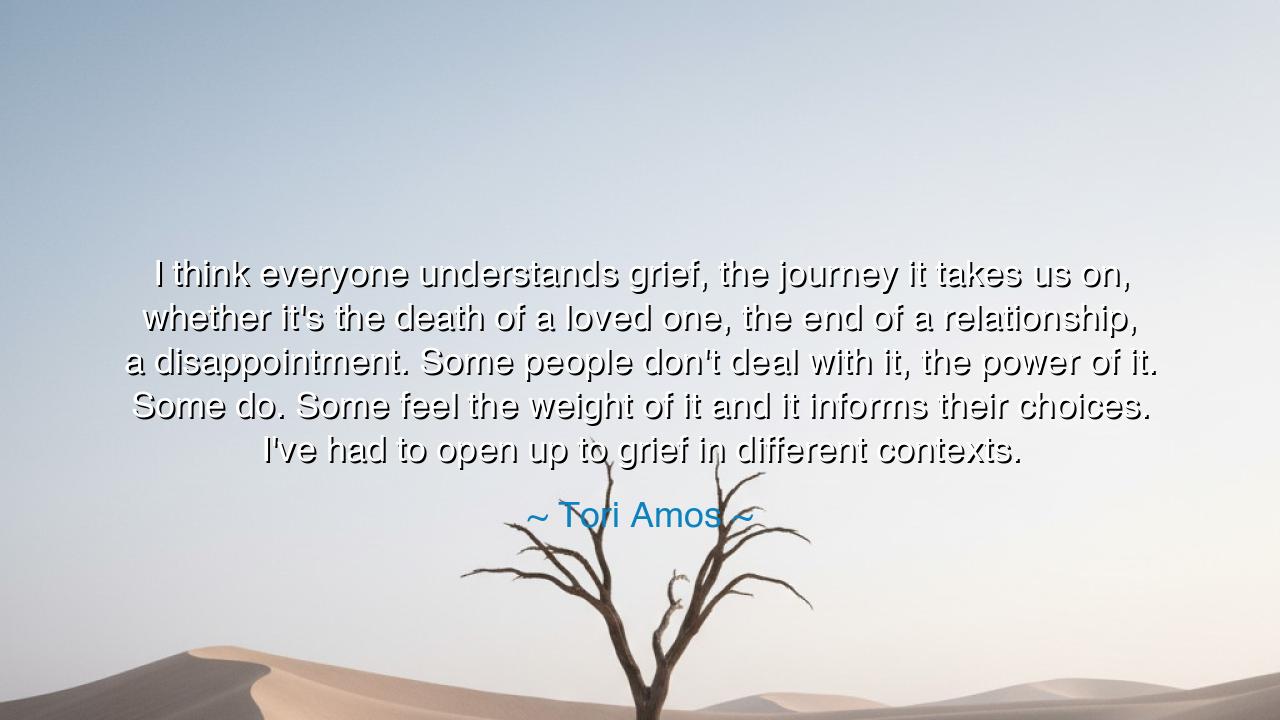
I think everyone understands grief, the journey it takes us on
I think everyone understands grief, the journey it takes us on, whether it's the death of a loved one, the end of a relationship, a disappointment. Some people don't deal with it, the power of it. Some do. Some feel the weight of it and it informs their choices. I've had to open up to grief in different contexts.






Hearken, O children of the ages, to the words of Tori Amos, who speaks of the sacred journey of the heart: “I think everyone understands grief, the journey it takes us on, whether it’s the death of a loved one, the end of a relationship, a disappointment. Some people don’t deal with it, the power of it. Some do. Some feel the weight of it and it informs their choices. I’ve had to open up to grief in different contexts.” Herein lies the ancient wisdom that suffering is a teacher, and the shadowed path of grief is a passage to deeper knowing.
From the dawn of human memory, the elders have taught that grief is not an enemy to be vanquished but a companion to be understood. Its presence shapes the soul, carving hollows where empathy, compassion, and strength may dwell. The journey through sorrow is universal, whether it arrives through the loss of a loved one, the closing of a relationship, or the sting of a disappointment. To encounter this shadow is to confront the fragility and the beauty of life itself.
Some, O seekers, shy from the weight of grief, fearing its power. Yet those who open themselves to its depths discover that grief can inform choices, guiding the heart with a clarity forged in suffering. As Tori Amos reveals, acknowledging the sorrow, rather than fleeing it, allows the spirit to weave wisdom from the threads of pain. Every tear, every ache, becomes a sacred teacher, shaping the way one moves through the world.
The origin of this understanding is as old as time itself. Across mountains, rivers, and deserts, sages and storytellers have whispered of grief as the crucible of the soul. To embrace it is to honor the human experience fully, to recognize that loss, in its many forms, molds character, sharpens insight, and deepens love. Those who open themselves to the journey of sorrow walk more fully, living with intention and sensitivity, carrying the lessons of their trials into every choice.
O children of the future, take these words to heart: the path of grief is neither to be feared nor denied. It is a force, a presence that shapes the spirit and informs the self. By opening to grief, one gains understanding, empathy, and a connection to the eternal flow of life, recognizing that even in sorrow, there is a light that guides the heart toward wisdom, compassion, and enduring strength.
If you wish, I can also create a version even more poetic and ritualistic, where grief is portrayed as a sacred river guiding the soul through the landscapes of loss. Would you like me to do that?






KNDo Kim Ngan
This quote from Tori Amos really makes me think about the many layers of grief we face throughout life. Grief doesn’t just come from the death of loved ones—it’s in the ending of relationships, unmet expectations, and sometimes even in the simple disappointments we face. How do you think people can better navigate grief in a way that doesn’t consume them but allows them to heal and grow from it?
NNNam Nguyen
Tori Amos makes an interesting point about how grief informs our choices. When we experience loss or disappointment, it’s easy to either shut down or let it affect our every decision. Do you think there’s a way to heal from grief without allowing it to alter the path we take in life? Can we ever fully ‘move on’ from grief, or does it always stay with us in some form?
PNTruong Ngoc Phuong Ny
I agree with Tori Amos that grief can shape our decisions and even our identities. It’s fascinating how grief is a universal experience, yet everyone processes it so differently. Do you think that grief, in some cases, can be a source of strength, like a driving force that pushes people to make significant changes in their lives? Or is it more of a heavy burden that makes us question everything?
LNLucy Nguyen
Tori Amos’ reflection on grief really hits home. It’s true that grief comes in many forms—not just through death, but in the loss of relationships, dreams, or expectations. How do you think the way we handle grief impacts our long-term mental health? Some people suppress it, while others let it shape them. Can grief, if embraced, become a catalyst for personal growth, or does it always weigh us down?